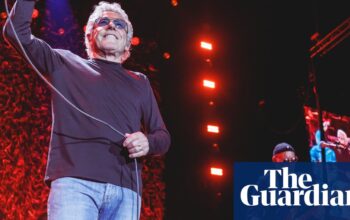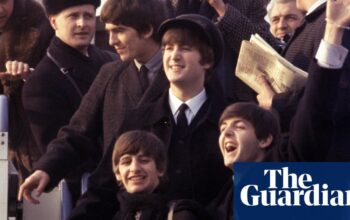O
Upon awakening, Brittany Howard plans her persona for the day, choosing attire and music to match. Today, she envisions herself as a “French Riviera teacher”, sporting white trousers, a white top, and a blue work shirt with a Women Love Me, Fish Fear Me hat while holding her newly spayed puppy, Wilma. In the past, Howard has taken on other characters, such as a fan of country singer Luke Bryan, complete with camo Crocs and singing his song Huntin’, Fishin’ and Lovin’ Every Day.
It is surprising to hear this multi-faceted and captivating singer interpret lyrics written by a country musician known for his silly antics. However, Howard, the lead singer of the renowned rock group Alabama Shakes, has a diverse range of talents and accomplishments. She has been nominated for 25 Grammy awards and has won nine times, and has also performed alongside music legends such as Paul McCartney and Elton John. Howard also has a passion for fishing and enjoying life, although she may not love every day equally. In the past, she even had a Twitter account dedicated to rating hotel bathtubs, using humorous categories like “loneliness” and “drownability”. She explains that her ability to embody different personas is a form of “inner-child work”, a therapeutic approach used to process and overcome lingering behaviors caused by past trauma.
Howard only deviates from this habit when she is creating music. It is the music that carries out the task: discovering oneself, breaking down and questioning patterns, and expressing love and happiness amidst a troubled world. Her second solo album, What Now, was recorded at the Sound Emporium in Nashville, with additional elements added at RCA Studio B in another part of the city.
The title has a dual interpretation. Many have frequently expressed frustration with the state of things during the pandemic and political turmoil. However, it also hints at the unpredictable nature of the album’s contents. A mix of calming crystal sound bowls, energetic rock’n’roll, funky acid, house music, soulful Memphis vibes, and free jazz trumpet creates an intriguing sense of what’s to come.
Ever since she first started performing with the soulful group Alabama Shakes, Howard has always been full of creative energy. Their music is driven by guitars and grooves, and manages to be both modern and reminiscent of the past. When their debut album Boys & Girls came out in 2012, Howard went from working odd jobs like bagging groceries and delivering mail to performing their popular song Hold On at the Grammys, opening for Jack White, and even playing alongside Prince.
Howard admits that she was not ready for the life she ended up living. She had never experienced financial stability or had opportunities presented to her. She also felt that she was not supported by others in the public eye. Constantly being on tour caused her to lose connection with her home and she felt very isolated. When it was time to work on a new album, the constant stress and non-stop touring had taken a toll on her mental health, leading to a state of deep depression.

In 2015, she found herself in her basement, writing the band’s exceptional and Grammy-winning second album, Sound & Color. There is a possibility that it could be their final album, although Howard clarifies that the band may not be finished. Her next project, Jaime, was named after her late older sister who passed away at the age of 13 from retinoblastoma, a type of eye cancer. This solo project was unique in that it did not feel like a distraction, but rather a revelation and a release. She was not just a typical rock star, but something more. Patterson Hood, the lead singer of the Drive-By Truckers, who the Shakes opened for before signing with a record label, describes her as “one of the most outstanding artists of our generation.”
Howard reflects on the changes he has undergone while working on this project and the previous one, as he pets Wilma who is wearing a lampshade-style guard after surgery. He acknowledges that he has grown and become more mature through these experiences and has also become more easygoing in a positive way. He is beginning to gain a clearer understanding of his future goals, though he prefers not to delve into existential discussions.
It is difficult to avoid feeling existential when conversing with Howard. Howard, who is 35 years old, was born in Athens, Alabama. Being both mixed race and queer, and also taller than her female peers at school, made it nearly impossible for her to fit in. She hesitates to describe her childhood as poor, instead choosing to use the term “resourceful.” She recalls, “I had clothes from Tommy Hilfiger that I bought from a van, and we always had enough food. However, there were also times when we didn’t have hot water and the electricity was shut off.”
She acquired the skill of playing music on her sister’s guitar and consumed various albums such as Pink Floyd, Prince, and Elvis. Despite the challenges of their upbringing, she views everything as a miracle.
After the death of Jaime, the family’s relationships became strained. Her parents ended up getting a divorce and her faith underwent a transformation – she no longer held onto organized religion. “I do believe there is more to life than what is visible to us. But do I subscribe to the belief that Jesus and God are white beings residing in the sky who judge us? No,” she expresses. “But if that is your belief, feel free to continue with it.” As she grew older, she became aware that people were capable of heinous acts, especially in the southern United States. One of the tracks on Jaime, titled “Goat Head,” recounts the time when someone slashed her Black father’s tires and placed a goat’s head in the backseat.

Living in the southern region brings about a sense of inner turmoil for this individual, as it is deeply ingrained in their heritage. Their family has a long history in this area, even before it became an official part of the country. Despite this, they are constantly faced with the question of whether or not they truly belong here due to their race, background, and sexual orientation. They firmly believe that this place is their rightful home, just as much as it is for those who have traditionally held power. However, finding a way to coexist harmoniously is a challenge that is explored on their latest album, What Now. This sense of finding peace amidst the discomfort is a recurring theme throughout the album.
During the pandemic, Howard composed the majority of the album, a period she refers to as “a bittersweet present” for someone used to constant traveling. After marrying fellow musician Jesse Lafser in 2019 and relocating to New Mexico, they eventually divorced. However, Howard found love once more and the first track of the album, “Earth Sign,” was inspired by a mystical desire for a soulmate – and it came true. (She prefers to keep the specifics of this romance private.)
During a time of global hardship, she found herself feeling more content than she had in a while – perhaps even more so than ever before. She reflects on the song “Another Day,” which addresses the conflicting messages of hiding and fearing one’s neighbor, and being suspicious. Despite all the chaos and turmoil, she manages to find love amidst it all and remains resilient.
Howard lives a peaceful life in Nashville, where she resides with her pets and enjoys strolls in the park. After our interview, she will depart in her sturdy truck, equipped for fishing, and dine with friends in the town. She is content with her ordinary routine and desires little, except for a 1988 Dodge Plymouth, her first car that was passed down from her great-aunt. “My main purpose in life is to explore my own creativity,” Howard states. During a recent meal with Joni Mitchell at an event honoring the renowned songwriter, they conversed about animals and art rather than music. “She was incredibly kind,” Howard recalls. “And she seemed just as uncomfortable as I did, like she never quite got used to the extravagance they bestowed upon us. I really admired that and admire her for staying true to herself. She followed her own path and I aspire to do the same. I want to be unique.”

Despite her desire for a rural lifestyle, she enjoys living here amongst fellow creatives and her close-knit “queer mafia” group, which includes musician Becca Mancari. Mancari is a featured performer on the What Now tour and collaborated with Howard on their 2023 album, Left Hand; Howard affectionately refers to Mancari as “my little big brother”.
Mancari, who was briefly involved in a side project called Bermuda Triangle with Howard and Lafser, explains that there is both a spoken and unspoken understanding among queer musicians of color in the southern region. The music they create together and individually holds significant importance. Knowing and having a relationship with Brittany is like experiencing something unfamiliar yet extraordinary. It is similar to being in the presence of someone incredibly authentic. Witnessing Brittany’s ability to produce sounds from a mere cardboard box in her living room leaves one feeling unbound by limitations.
During the production of What Now, a variety of unconventional items, such as cardboard boxes, forks, and an empty water jug, were used as instruments by co-producers Brittany Howard and Shawn Everett. Jazz drummer Nate Smith also contributed percussion to the album. Howard and Everett implemented questionable techniques and ideas in the recording process, breaking traditional music-school rules and adding a unique texture to the album. For example, Smith even played on a trash bin, much to Howard’s delight. The lyrics and music on the album evoke different emotions, creating an unpredictable and raw portrayal of human feelings.
Red Flags evaluates her responsibility in the collapse of a romantic relationship, while Prove It to You is a romantic tune with an industrial sound. At its essence, What Now simply poses questions about partnerships, death, and a world that can be harsher than kind. Howard reveals, “I am someone who attends therapy and actively examines myself. It’s about recognizing patterns – why do we keep finding ourselves in the same situations? I wasn’t willing to continue repeating the same mistakes. And it’s not just about one person, it’s a cycle I’ve been stuck in since my 20s. I’m finally breaking free from it.”
Her recognition of her imperfections is apparent in the style of her singing: “There are moments on this record where I don’t try to perfect my voice. It’s not flawless. It can be peculiar at times. Maybe I even have a slight lisp. But that’s just who I am, and you can either accept it or not.”
The concluding statement in the album, sung by Howard, is: “I cannot believe I have exhausted all my rainbows,” followed by a trumpet solo. This open-ended ending is fitting for a world that does not offer a clear path through chaos; we must discover one on our own. “That’s how disorder arrives,” Howard reflects. “It comes suddenly and makes us uneasy. That was the main idea – to show that all of these things can coexist. There’s no tidy resolution and this is not a flawless record. It’s titled What Now … there will always be challenges. Who knows what will come next? Those are the moments to keep playing.”
The release date for What Now is February 2nd, and it will be available through Island Records.
Source: theguardian.com


